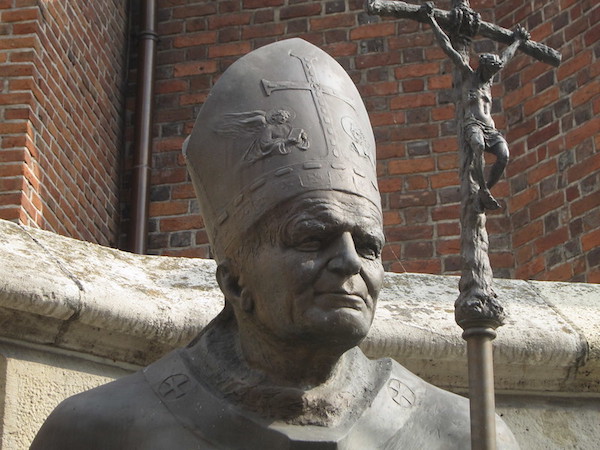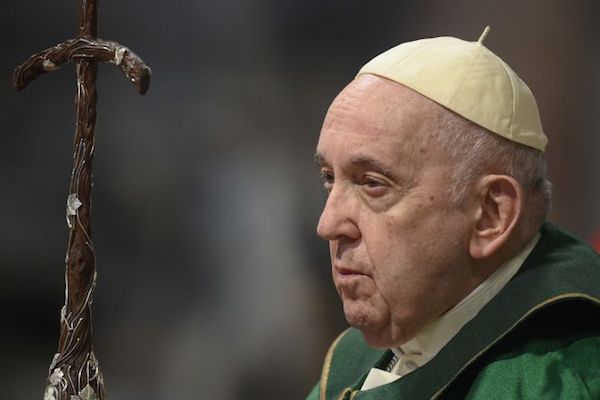Pope Francis’ vision for the Church is about “recovering the dynamism of the early Church”, which was a led by the Spirit, missionary and synodal, and in which the whole people of God participated in the making decisions, papal biographer Dr Austin Ivereigh has said.
Speaking at the Tablet webinar: “Francis at 10: Where is the Pope leading our Church?”, Dr Ivereigh said that in this model of Church, “The authorities take the decisions, but only after an intense listening, in which everybody is involved.”
The journalist, author and commentator discussed Pope Francis’ efforts to put the Church’s central government into a missionary key through his apostolic constitution reforming the Roman Curia, Praedicate Evangelium, which was published in March 2022.
Responding to a question about how this vision of Pope Francis should impact dioceses and parishes at ground level and why it is sometimes not filtering down he said: “I think this is a really key question in assessing the impact of Francis’ pontificate after 10 years. The question to ask is what is happening in the local Church in response to these changes?”
He highlighted Pope Francis’ vision for the whole Church as set out in the first paragraphs of Praedicate Evangelium and noted that it is the first time in the Church’s history that we have had a vision of a synodal Church: “A Church that discerns and dialogues is right at the heart of the vision.”
He said another document containing a “very beautiful” insight into Pope Francis’ vision for the Church is the new apostolic constitution for the Diocese of Rome, In Ecclesiarum Communione, which requires every parish to have a pastoral parish council, while the bishop must listen intently at all the times to where the Spirit is speaking through the people.
The vision outlined in the two documents, Dr Ivereigh suggested, would be “the Francis legacy”.
“The real problem of the Church in the western world is that people consider it a corporation not an institution led by the Spirit,” he commented and recalled his recent encounter with young Catholics in California, who were enthusiastic about their Catholic education and their faith in Jesus Christ and Gospel values but had no desire to belong to the Church.
Their “disaffiliation” from the Church was because they saw it as similar to a corporation that was “hiding the scientific evidence of the connection between fossil fuels and climate change”.
Ivereigh observed, “What is the sex abuse crisis, but that…?”
Ten years into Pope Francis’ pontificate, the Synod was revealing a real struggle in the Western Church between everything that smacks of a corporation – “everything that is Gnostic and Pelagian about the Church – and Francis’ model of a Church of the people of God that is synodal, led by the Spirit, discerning, in dialogue and participatory.”
Argentine theologian, Professor Emilce Cuda, is known for interpreting the teachings of Pope. Francis named her head of the office of the Pontifical Commission for Latin America and last year he appointed her to the Pontifical Academy of Social Sciences and to the Pontifical Academy for Life.
Speaking about Pope Francis’ tenure and his battle to reform the Catholic Church, Prof Cuda suggested that those putting Francis’ social teachings into practice is where the Church is to be found.
“What you call Francis’ vision, may be it is the Gospel vision. Evangelising is to care for the relationship with God, with nature, and with people,” she told the webinar. Stressing that, “Christianity is not a cult”, she added, “It is living the Word in the public space.”
According to Prof Cuda, under Pope Francis, Catholicism has “recuperated” a lot of Catholics “who might not be in the Church all the time”.
Dr Ivereigh recalled a talk he gave at the University of Baylor in Waco, Texas on integral ecology to young Baptists and Methodists. They were “all completely taken by integral ecology, they have been converted by it and they are fascinated with Francis. Each of them had a story of conversion, of encounter with Christ through Laudato Si’.”
Referring to Mgr Tomáš Halík’s address at the beginning of Prague ecclesial assembly on the Synod, in which he said the Church has to discover now where the future is, Dr Ivereigh added: “It is only going to discover that by going out to find out what the Spirit is already doing out there – the action of God that is already happening.
“And that’s why to develop a capacity for deep listening, which is really what synodality is, is so crucial to what [Pope Francis] has been seeking to bring about.”
Asked by Mike Lewis, who runs the blog Where Peter Is, what will it take to bring about unity and reconciliation with those Catholics, including bishops, journalists and theologians who have rejected the message of Pope Francis, Prof Cuda responded, “I am not sure if we are in a real division.”
She said the Church was that of Peter and Paul and that communion provided the possibility to communicate and to build the bridges between the different positions.
Noting that Pope Francis had recognised that resistance is inevitable in any process of conversion, Dr Ivereigh expressed concern over the kind of “opposition that goes to the edge of schism”.
The “schismatic mentality” of prelates like Archbishop Viganó is a deep concern he acknowledged and said it was prevalent in radical traditionalist circles, “where you can see what has been going on in Trump’s America has really deeply infected the Church”.
“We need a Church that is able to contain diversity and disagreement, and that enables that disagreement to be fruitful and generative rather than fall into sterile contradictions and conflict,” he said.
On the question of whether doctrine could develop under Pope Francis on contested issues, Dr Ivereigh said: “I think doctrine already has developed. Amoris Laetitia, which is the fruit of the Synod on the Family process, started by listening to the pain of those on the margins who are divorced, or afraid of committing to marriage, and that led to a pastoral programme.”
“The Church still obviously profoundly believes in the indissolubility of marriage and the law on the sacraments hasn't changed.”
But he said that with Amoris Laetitia the way these are applied is “much more nuanced, much more attentive to individual circumstances”.
On the Church’s teaching on LGBTQ relationships, while he didn’t believe the Church’s doctrine on sexuality would change fundamentally, he said Pope Francis had transformed the way in which the Church has responded to this challenge and had asked why, when we talk about sinfulness, we apply it to sexual sins only and not to other kinds of sins.
For Prof Cuda, each continent is in a different social place and while in the West, the issues might be about abortion and marriage, in Latin America, for the poor in the peripheries the issue is the life itself and survival.



 Loading ...
Loading ...